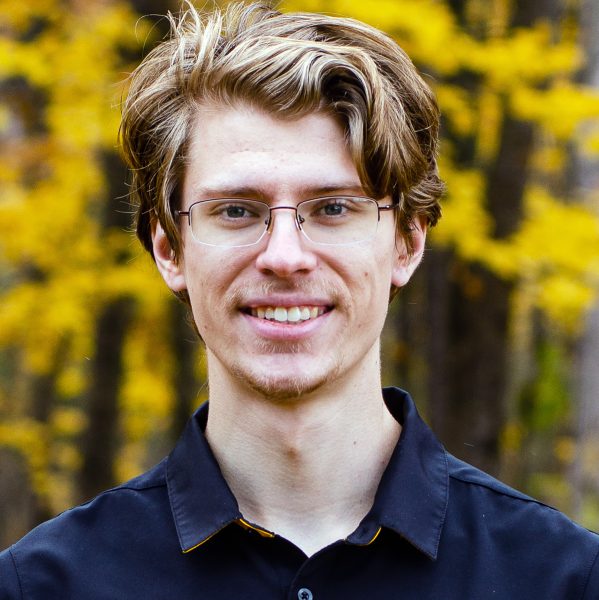
The Department of Computer Science is pleased to welcome Dylan Gaines, a research assistant professor. Gaines completed his PhD at Michigan Tech in spring 2023 and became a faculty member in spring 2024.
Gaines’s research interests lie at the intersection of natural language processing and human-computer interaction, where he investigates the applications of neural language models to create accessible interfaces through user-centered design. He became interested in this research area as an undergraduate while working on text input studies with Department of Computer Science faculty member Keith Vertanen.
“Attending my first conference as an undergraduate showed me what an impact language modeling could have on accessibility in computing—and on the lives of people with disabilities,” he says. “Since then, I’ve been hooked!”
In a recent research project, Gaines collaborated with the Consortium for Accessible Multimodal Brain-Body Interfaces (CAMBI), a multidisciplinary group led by Oregon Health and Science University, to investigate methods to use brain-computer interfaces to create communication aids for people with severe speech and physical impairments.
Gaines loves the challenges that teaching brings. “Explaining concepts to students from different backgrounds and experiences forces me to revisit the way I think about problems,” he says.
“No two students are the same,” Gaines says. “People come from all sorts of different backgrounds, learn in different ways, and bring different perspectives to problems. This is what makes academia so great.”
To Gaines, teaching is only partly about the specific content for a course. “While the content is important for students’ success, teaching is often more about the students learning how to think, how to solve problems, and how to learn new skills,” he says.
“Lectures are boring!” he says. “If at all possible, I avoid just lecturing for an entire class period. I try to incorporate activities into class that allow the students to check if they understand the content by putting it into practice.”
In his teaching, Gaines often thinks back to when he was in his students’ shoes. “I try to remember the things that made me like or dislike a certain class, and use that to improve my teaching,” he says.
This semester, Gaines is teaching Programming at the Hardware/Software Interface (CS1142).
Gaines’s first visit to Michigan Tech was as a high school student. Knowing that he wanted to go into computer science, he looked at several technological schools in Michigan.
“I loved everything about Michigan Tech from the area to the professors and the accelerated master’s program,” Gaines says. “Once I got here as an undergrad, that love only grew and I decided to stay for grad school as well. When I was presented the opportunity to continue as faculty, I couldn’t pass it up!”
Gaines was on the Michigan Tech Cross Country and Track teams as an undergraduate, and during graduate school he was a graduate assistant coach for the program. He continues to engage with the team as a volunteer coach.
“Being a student-athlete here really helped to mold who I am as a person, and volunteering with the team helps keep me in shape,” he says.
View Dylan Gaines’s faculty profile.
Read more about Dylan Gaines on the College of Computing news blog.
View some of Gaines’s scholarly publications on Michigan Tech Digital Commons.
The Michigan Tech College of Computing, established in 2019, is the first academic unit in Michigan dedicated solely to computing, and one of only a handful such academic units in the United States. The college is composed of two academic departments. Department of Computer Science bachelor of science degree programs are in computer science, cybersecurity, data science, and software engineering; master of science programs are in applied computer science, cybersecurity, and data science; and a doctoral program is in computer science. Department of Applied Computing bachelor of science degree programs are in cybersecurity, electrical engineering technology, information technology, and mechatronics; master of science degree programs are in health informatics and mechatronics; and a doctoral program is in computational science and engineering.
Follow the College of Computing on Facebook, Instagram, LinkedIn and Twitter.